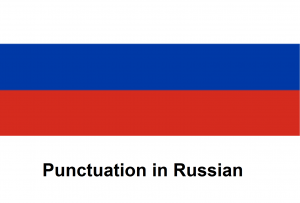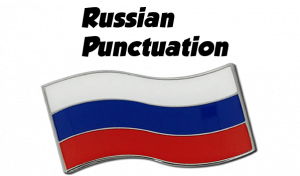Difference between revisions of "Language/Russian/Grammar/Punctuation"
(Punctuations in Russian) |
m (Quick edit) |
||
| (2 intermediate revisions by 2 users not shown) | |||
| Line 1: | Line 1: | ||
[[File:Punctuations in Russian.png|alt=Punctuations in Russian|thumb|Punctuations in Russian]] | [[File:Punctuations in Russian.png|alt=Punctuations in Russian|thumb|Punctuations in Russian]] | ||
Hi Russian learners, | |||
In today's lesson you will learn about the punctuation in Russian. | In today's lesson you will learn about the punctuation in Russian. | ||
Russian punctuation has some important particularities. | |||
Here are the main ones: | |||
. | <span link>With the completion of this lesson, consider investigating these related pages:</span> [[Language/Russian/Grammar/Genitive-Case|Russian Grammar → Russian Nouns and Gender → Genitive Case ...]], [[Language/Russian/Grammar/Use-of-the-verb-%D0%B1%D1%8B%D1%82%D1%8C-in-the-past|Use of the verb быть in the past]], [[Language/Russian/Grammar/Questions|Questions]] & [[Language/Russian/Grammar/How-to-Use-be|How to Use be]]. | ||
==Comma== | ==Comma== | ||
It should be used to separate the main proposition from the subordinate: | It should be used to separate the main proposition from the subordinate: | ||
*'''I do not understand what you are talking about. = Я не понимаю, о чём вы говорите.''' | *'''I do not understand what you are talking about. = Я не понимаю, о чём вы говорите.''' | ||
On the other hand, we do not put it after a circumstantial complement, if it is placed at the beginning of the sentence: | On the other hand, we do not put it after a circumstantial complement, if it is placed at the beginning of the sentence: | ||
| Line 34: | Line 21: | ||
==Dash== | ==Dash== | ||
It replaces the verb to be in the present between two nouns. | It replaces the verb to be in the present between two nouns. | ||
*'''Sonia is Vania's sister. Соня — сестра Вани''' | *'''Sonia is Vania's sister. Соня — сестра Вани''' | ||
However, we don't put it between a pronoun and a noun, or a noun and an adjective | However, we don't put it between a pronoun and a noun, or a noun and an adjective | ||
| Line 45: | Line 32: | ||
==Sources== | ==Sources== | ||
http://russe.inalco.chez.com/L0GRAM/GRAM_LO/ponctuation.htm | http://russe.inalco.chez.com/L0GRAM/GRAM_LO/ponctuation.htm | ||
{{#seo: | {{#seo: | ||
| Line 53: | Line 39: | ||
}}[[File:Russian Language Punctuation Rules.png|thumb]] | }}[[File:Russian Language Punctuation Rules.png|thumb]] | ||
[[Category: Russian/Intermediate]] | [[Category: Russian/Intermediate]] | ||
==Other Lessons== | |||
* [[Language/Russian/Grammar/How-to-Use-Have|How to Use Have]] | |||
* [[Language/Russian/Grammar/Personal-Pronouns|Personal Pronouns]] | |||
* [[Language/Russian/Grammar/A-vs-И|A vs И]] | |||
* [[Language/Russian/Grammar/Future-Tense|Future Tense]] | |||
* [[Language/Russian/Grammar/Perfective-Imperfective|Perfective Imperfective]] | |||
* [[Language/Russian/Grammar/Tricky-Adverbs|Tricky Adverbs]] | |||
* [[Language/Russian/Grammar/The-verb-to-have|The verb to have]] | |||
* [[Language/Russian/Grammar/Common-Mistakes|Common Mistakes]] | |||
* [[Language/Russian/Grammar/Very-important-rules|Very important rules]] | |||
* [[Language/Russian/Grammar/Present-Tense|Present Tense]] | |||
<span links></span> | |||
Latest revision as of 23:29, 26 March 2023
Hi Russian learners,
In today's lesson you will learn about the punctuation in Russian.
Russian punctuation has some important particularities.
Here are the main ones:
With the completion of this lesson, consider investigating these related pages: Russian Grammar → Russian Nouns and Gender → Genitive Case ..., Use of the verb быть in the past, Questions & How to Use be.
Comma[edit | edit source]
It should be used to separate the main proposition from the subordinate:
- I do not understand what you are talking about. = Я не понимаю, о чём вы говорите.
On the other hand, we do not put it after a circumstantial complement, if it is placed at the beginning of the sentence:
- Last year, we went to Russia. = В прошлом году мы ездили в Россию.
Dash[edit | edit source]
It replaces the verb to be in the present between two nouns.
- Sonia is Vania's sister. Соня — сестра Вани
However, we don't put it between a pronoun and a noun, or a noun and an adjective
- He's an engineer. = Он инженер.
- Katia is beautiful = Катя красивая
Sources[edit | edit source]
http://russe.inalco.chez.com/L0GRAM/GRAM_LO/ponctuation.htm
Other Lessons[edit | edit source]
- How to Use Have
- Personal Pronouns
- A vs И
- Future Tense
- Perfective Imperfective
- Tricky Adverbs
- The verb to have
- Common Mistakes
- Very important rules
- Present Tense

